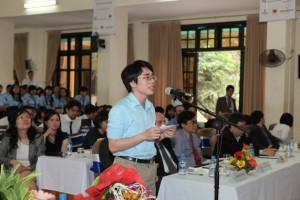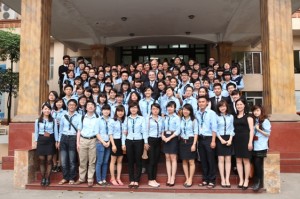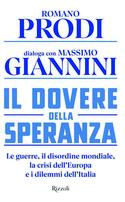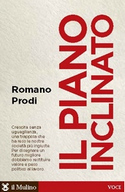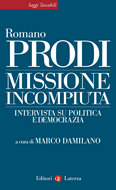Politics and peace: worldwide cooperation in the age of globalization
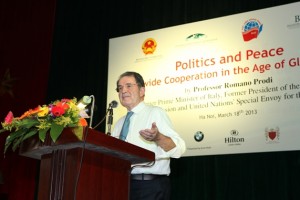 “Politics and peace – worldwide cooperation in the age of globalization”
“Politics and peace – worldwide cooperation in the age of globalization”
Speech of President Romano Prodi, at the Diplomatic Academy of Vietnam in Hanoi on Monday, March 18, 2013
Dear Professors and my dear students, I want to thank first of all the International Peace Foundation for having organized this seminar and the Ministry of Education and the Diplomatic Academy of Vietnam for having invited me to deliver this speech. However, this is not going to be a conventional talk, but rather a conversation. I shall be brief and I would like to have dialogue with you. And apologies if I will skip you in the first rows and I will mainly address to the students in the back. Because they will be the leaders of the Vietnam of tomorrow, they deserve special attention. My topic for this conversation will be “politics, peace and cooperation”. Let us begin from a very simple statement. Everybody of you knows that the 18th and 19th centuries were the centuries of Europe, as they were dominated by European nations. The short 20th century, from the First World War onwards, was the American century and in theory even the 21st century was supposed to be an American century, but now many analysts and policymakers suggest that this is going to be the Asian century. What does that mean? Why this change?
These are important questions on which to reflect: What has changed and what is changing?
Twenty years ago the American scholar Francis Fukuyama wrote a book with the title “The End of History and the Last Man”. His argument was that American power and its social and political culture was so strong and so dominating in the world that history was ending. Now, twenty years later we are at the beginning of a new historical process. Thus, we have to think what is happening and why it is occurring.
Usually, big changes at the international level occur because of changes in economic and political reality and also because of mistakes done by politicians and leaders. In this case we have both. On the one hand, there is the growth of Asia, not only of China, but of Asia as a whole. On the other hand, we had a series of big mistakes that brought to the war in Iraq. The war in Iraq was supposedly to be the symbol of American power. It was supposed to be a very simple and short military operation with the goal of stabilizing the entire Middle East. At that time I was the President of the European Commission. In such a position every single day I could clearly see the evolution of this operation. This was the beginning of the change, a deep, profound change. Let us keep in mind a couple of figures, not many, I don’t want to overwhelm you with figures, but some of them are useful. In the 1950s, after the Second World War, US GDP was around 50% of the entire world GDP. American, Canadian and European GDPs combined were approximately 68% of the world’s GDP. Now US GDP is around 20%, Europe’s is 20% and Canada is from 3 to 5%. Thus, all together, instead of 68%, they have half of the world’s GDP. This is a fantastic and impressive change that has taken place in less than half a century. Moreover, in the 1950s, the US was responsible of 45-50% of world’s military expenditures. Today the US, with 20% of the world’s GDP, is still responsible for approximately 45% world’s military expenditures. This means that while in the 1950s there was a balance between GDP and military expenditures, now the situation is profoundly unbalanced.
This partly explains why we have had this change in the world, which is commonly called a passage from a unipolar to multipolar world, from a world that is dominated by only one country to a world in which you have more than one protagonist. Clearly, what is going on in the economic field is not going on in the area of military, as I explained before. The United States is still by far the most powerful nation in the world and its high military expenditures clearly explain this situation. But it is not easy in this situation to keep the budget in order, and this explains at least in part how difficult the American “budget politics” is now in Washington. You have an historical perspective of the debate that is going on since six months inside the United States about the fiscal cliff, of how to put the budget in order, the difference between the Republicans and the Democrats. This is of course also a consequence of the internal expenditure but also the consequence of the big military engagement. Don’t forget that in this moment the United States has more than 1.000 military bases abroad, some small and some big, and 350.000 military personnel abroad. Thus, this is a very heavy burden for the United States. If you compare it with Europe, with almost the same GDP as the US, the military expenses is a fourth or a fifth.
While this is the military side, if one looks at the economic growth rates you have a great change as well. Starting symbolically from 1978, but a little later in real facts, China and all ASEAN countries started to develop in a very different way than the rest of the world and now this is changing the social and economic reality of the world. I don’t want to give you too many figures, but what is the reality today after the crisis? We have 7.5% growth in China and together with Asia an average growth of 6%, 2% growth in the United States and 0% in Europe. You know, from 7% to 0% there is an enormous difference, even from 2 to 6% is a big difference!
But the world is changing so deeply that it’s not only Asia that’s moving. In spite of everything that has happened and in spite of common opinion on Africa, in the last 6 or 7 years Africa is growing not so badly. This does not mean that that Africa will be a wealthy continent in a few years, because it’s starting from such a low level of wealth that it is still very poor with a lot of economic and demographic problems. Africa now has one billion people and in a generation it will be add another billion, which 2 billion people. Let me give you an example: the medium or average age in Germany or Italy is around 43 or 44 years, in Mali the average age is 18. This means that there is an incredible increase in the population and a very high proportion of young people in the country.
The US is still the first economy. It will be probably overcome in absolute terms by China in 10 years time, but we should remember that the Chinese population is 5 times more than the American population, so even in ten years time the average income will be 5 times higher in the United States than in China. Then, you have the so called BRIC: Brazil, Russia, India, China and other regional powers. Turkey, for example, is a new protagonist in the world.
In this period of power and economic transition, the western capitalistic economy went into a deep crisis, the longest crisis after the Second World War. We never had in Europe and even in the US such a long period of slow or negative growth. Now the US is recovering, Europe is slowly recovering and I think it will be out from the crisis in one year but with a low rate of growth. Now everyone thinks that even the quality of the development will be different and honestly, my dear students, I am not sure. Everybody during the crisis was talking about the necessity of reforms of the banking system, of the capitalistic system, of speculation; even Obama was suggesting that his country needed change and everybody was convinced that something will happen, but I don’t see any major change. Speculation is coming back not very differently from before, the banking system is not changing a lot. Thus economic and financial problems that we had a few years ago could, in my humble opinion, return again in the near future.
Secondly, there is another major change in the world that will significantly influence the coming international system. Everywhere in the world we have had one generation of increasing social injustice. If you take the period between the 1950s and the 1980s, economic justice was improving. There was less difference between the rich and the poor. Starting from the 1980s there has been an increasing difference between the wealthy and the poor. I stress this point because I believe that this is one of the roots of the financial crisis.
Increasing inequality is not only a phenomenon related to capitalist countries, but it is something that is occurring in China and India, too. In recent years we had improvements and a better situation only in Brazil, because there was a policy of economic support for the poorest families; and in the Scandinavian countries. Everywhere else in the world we have had an increase of the difference in income. This is not only a moral or an ethical problem. This is also an economic problem. We think that an increase in demand is needed, but how can you increase the demand if you have a decrease in families’ income? We live in a very contradicting situation where we ask people to buy more but we pay people less: such a situation can’t go on forever.
The problem of financial speculation and the contradiction between financial power and production are the real contradictions which we are likely to see more and more in the future. The consequence will be that in many countries the problem of unemployment will increase, because these changes are coming also with new technologies that are labor-saving. In so doing with rising unemployment, at least in the short term, social peace is likely to be jeopardized.
Why are we experiencing such a trend?
This trend is strictly linked with some characteristics of political competition in contemporary democracies, in which when you mention taxation you lose elections. The political manifesto that we have now in many countries is: let us decrease taxation regardless of the global and domestic consequences of that action.
Before I was telling you of the different rates of growth among countries and how China is rising with the possibility of reaching the American GDP in a ten years span. This is also because China has avoided so far any big military confrontation. China and other Asian countries did not deploy their combat forces in Iraq and in Afghanistan. They are not is Syria and they are not involved in any other armed conflict. Secondly, Asia started, this is a very important point, a new strategy in order to guarantee the future supply of food, energy and raw materials for their people. This is a completely new asset of the world. The Chinese, Indian and also Vietnamese demand completely changed the price of inputs in the world production, which had also a positive effect on the growth of African. However, this is also a major change in international politics. Indeed, where do you find food, raw materials and energy? They are and exist mainly in Africa and Latin America: the balance is moving toward these regions.
But these things change quickly and we had a major change in the last three years that nobody had predicted. That seems a technical change only, but it is a great change that is called “shale energy”. That is oil and gas taken by sands with a new technology. It was introduced in the United States in such a vast dimension that in just a few years it might change the directions of what is happening in the world. The United States, who were obsessed by the necessity of buying energy in the Middle East, now are almost self-sufficient in terms of energy and, even more important, are less politically dependent from that region. Thus, you might easily understand how this will change the future balance in the world and will modify the political goals of great powers. I mentioned the Chinese policy in Africa before, because in this moment China is the only country that is operating with a real continental strategy in Africa. France is concentrated on the previous French speaking countries (colonies), United Kingdom does the same in former colonies, while the United States is focusing especially on West Africa. China has instead diplomatic relations with 50 out of 54 African countries. In so doing, with its continental diplomacy Beijing is subverting the terms of power in Africa. This shows that international policy constantly changes, with a variety of contradictory forces and strong movements.
We nowlive in a time where many things change and move. Not only did we have a complete change in some Mediterranean countries like Egypt, Libya and Tunisia – what is generally called the ‘Arab Spring’, but you have a complete turmoil in the Sahel area, for which the United Nations have to take some responsibility. Moreover, there is another change that involves the role of terrorist organizations. In all the conflicts I mentioned before you find different interests. Let’s say in Iraq you had the US, the UK, Italy and Spain on the one hand, and France, Germany, Russia and China on the other. A similar pattern can be seen in Syria now with Russia and the United States. But unlike in these military crises, when you look at what is happening now in the conflict in Sahel, you don’t have such a split. For the first time in the post-September 11 period you have a completely common view of all the members of the Security Council: the United States, China, Russia, the United Kingdom, and France, all agree on the common fear of terrorism. How long will this go on? What will happen in the following years? Will this be enough to control terrorism? Will terrorism still spread after what happened in Afghanistan and Sub-Saharan Africa? It’s difficult to forecast, but it is another step in a changing the world. You have a new face of history: a complex multipolar situation of the world, in which you have many protagonists in different roles, not only one as you had in the past.
I want to give one example: what I call the Asian cluster, the new economic phenomenon of the world. It’s not China only, it’s not Japan or South Korea, it’s not Vietnam, but all these economies together. What is interesting for a scholar is that you have a clear contradiction in Asia. You have many tensions among the countries, but you have an economic reality that is becoming more and more integrated. In spite of the problems in the Pacific area, in spite of the tension on islands in the South-China Sea, it’s amazing that there is more and more a truly Asian economy. When we have an earthquake in Japan thousands of Chinese factories have to stop, because they lack a semi-product that is necessary to produce. Crossed investments are more and more happening in Asia, and this is really something that is changing the world. Will it be peaceful? Will it not be peaceful? This is the great question, but clearly from the economic point of view, this economic integration will tend to foster peace. This is the building of interdependence, and any political decision that goes against that will bring a cost. Of course, as a European I know that this will also change Europe and the world. I want to give you only one example, because I would like to be brief. Last year in February, President Obama was receiving the CEO and managers of Apple Computers, and he asked them about the company and they explained that all the manufacturing and assembly is done in China by a big company called Foxcomm which employs more than 250,000 workers. The managers told the President that the difference in costs, in wages, is not that important. Thus, President Obama asked: “why don’t you bring the production of Apple products back to California?”. The answer was absolutely unexpected: “because it is impossible”. Because the flexibility of the Asian cluster, the interaction between suppliers and demand and how they translate, software into hardware, in a very short time is not possible in the United States. This is only an example, but it means that in Asia you have not only a quantitative change, but you have also a quality change, that is also changing the wages and salaries in China and that will change competition in the future even more than now. Clearly, this is an enormous change.
I have been talking for more than half an hour without mentioning Europe. But I shall do so now, because the European Union is still number one with the US in GDP, number one in industrial production, and number one in exports. Europe is not only an economic giant, but in macro-economic terms it is healthier than the American economy. The US deficit is around 9% while the EURO-area is 4%. Moreover, the financial crisis started in the US, not in Europe. However, now Europe is experiencing the consequences of the crisis and, as I told you before, it does have a 0% growth, even in 2015. Why?
Because even if you have a sound and healthy economy, if you do not have a political power able to take quick and important decisions, then you will lose ground. Europe is in a very delicate moment in which we have done a lot, but no enough. Don’t forget that Europe started a project that made the European Union as the most important achievement in world politics since WWII. In Europe we have changed the nature of the state. If you think to the foundation of the state after Westphalia, a state is based on two main pillars: the army and the currency. If you have a common currency and no more a national currency, you change the nature of the state, and Europe has done that and even more. Not only in the areas of trade and in investments, but also concerning political decisions. But such a change, achieved in a peaceful way, is difficult, and needs a lot of time and a wide agreement among countries. Thus, Europe is in a delicate moment where, I think, we are going in the right direction while doing something which nobody has ever done in the world. We are clearly leading the change and helping the future peace, guiding the change from a nationalist notion of the state to a co-operational concept of it. This is a long and difficult way. It should not come as a surprise that we shall complete this project only in the future. Thus, Europe will not go in disarray and that the Euro will not go down. Europe after the crisis of last summer will still be among the protagonists of the world economy and so, in this pluralistic world, Europe is there.
But in the end, let’s say, you understand that because of the pluralistic, multipolar world you should need an authority in the world. We need a truly United Nations or a super-nation authority more than in any other time in history, because there are many players and a lack of cooperation. Great powers, all of them, don’t use the United Nations as a referee or as a regulating power in the world. This disappointing situation makes the necessary great reforms difficult to devise. One example is the new of a renewed international monetary system, which is currently lacking. It was decided in 1944, during the war, and it was done inside the United States at the Bretton Woods Conference, because the US was the only country in which you could do that. They were the only global power that was not invaded and so they imposed a new monetary order. Clearly now we should reform it, adapting the rules to the multipolarity of the world. But there is no international authority that is able to do that.
In all papers released before a G20 conference, you usually read: “G20 will make great progress in the direction of an international agreement”, “a monetary agreement in order to regulate the financial taxation of the world is the main goal of the meeting”, and the like. Don’t trust them, because now, in this moment, reform will not materialize. For a very simple reason: on the one hand the United States is well placed and doesn’t want to change the system; on the other, China doesn’t want to change it because Beijing will be better off if the change will be made in the future when the country is more prepared and stronger for influencing the reforms. Thus, my main message today is that we are in a multipolar international system with many important players and so full of potential new energies, but we lack a world referee to do that and so we need a lot of wisdom, we need a lot of self control in all the problems: from the problems concerning the islands in the Pacific area to the problems regarding the Middle East and the energy sector. We will face a delicate period in which we must use wisdom. We would also need a common superior authority, but I can’t tell you that this will come soon: such a political entity will take a long time to appear. So my dear young students, it is up to you to work in the right direction, to clearly understand that this complex world will need understanding, goodwill, openness and even more the necessity of thinking that different political systems can go together. Only in such a way we can have the peace we want and we need. Thank you.
My question is about the problem at the Korean Peninsula. I would like to hear your opinion about Korea and the rise of the tensions between the North and the South, which seems more and more serious.
President Romano Prodi:
The problem between North and South Korea has been going on for decades. We should not underestimate the tensions between the two countries because you should never underestimate a conflict when nuclear weapons are involved. Clearly, the nuclear arsenal of North Korea is not comparable to the American arsenal or to the one of Russia, but it is still a great danger. This is one of those long-lasting problems difficult to tackle. To impose new sanctions might be politically useless and damaging for Northern Koreans. Indeed the international community went from imposing tough sanctions to bringing some relief goods, and then sanctions again. These changes clearly signal the difficulty of elaborating a consistent and effective policy.
There was some hope with the change in the leadership in North Korean, but now we see that nothing has really changed.
You understand that I am not really answering your question. At this time nobody is taking a decision for military action or considering to toughen up the sanctions. These choices would be worsen the already difficult humanitarian situation in North Korea. So my thinking is that in the foreseeable future we shall go on with the current situation. Of course, I do hope that some wisdom will prevail. I do hope that the deep suffering of a people will be heard and will have consequences, but until now I don’t see any concrete decision in this direction. This is a sort of non-answer, but it’s an honest response, because I think the situation will not be solved soon.
Question:
It is a great honor to listen to your speech, and I’d like to say that I am deeply sorry to bring up this matter, but in your speech you have briefly mentioned about the EU, the EURO crisis without any specific details or specifications about your country Italy, even though your country together with Spain, Portugal and Greece form the four leading countries in the crisis. Moreover your country Italy is currently in an electoral deadlock, meaning that you do not have a government yet. So this leads to my question what your suggested solution for this current political and economical instability in Italy would be?
President Romano Prodi:
I told you before that the economy of Europe is much healthier than the one of the United States. The average debt of the EURO area is 4%, this is nothing compared to the American 9%. In Europe we have created a common currency, which was a great achievement. But we didn’t create the common fiscal policy that is necessary to accompany the monetary policy. You will ask me: Why have you done this mistake? When I was President of the European Commission I was discussing this in my long and deep conversations with the European leaders, starting from the former German Chancellor Helmut Kohl, who was the leading political actor in this area. As an economist, I told him many times that we had to accompany the monetary policy with a coordination of the general economic policy. I also faced many troubles because I said that the Stability Pact (i.e. the pact shaping the EURO) was stupid. I know it was a very harsh expression, but I believed and I still believe that you cannot have a monetary union without a fiscal union. The wise answer of European politicians was: “look President Prodi, we have made the first step and the other steps will follow in the following years. European integration as in democracy is a step by step process”.
But what happened was that history was changing quickly, and Europe changed because of new populist parties, because of fear, fear of competition, fear of China, fear of immigration. Thus, the economic reforms have not been taken yet. And we are left with a monetary union without the appropriate pillars to support it. The disequilibrium among the different European countries, more with Germany and the other countries has increased time after time until the crisis in Greece. The Greek crisis was a relatively small crisis, but as it happens many times in democracies the solution was delayed because there were elections, in this case in Germany. So a small problem got delayed and delayed until it became a huge problem, and then the infection was passed over to Spain, Portugal, Iceland and Italy. Last summer, however, the European Central Bank took a decision that will put the Euro in a safe area forever, with still difficult management problems and with difficult decisions to take. But nobody thinks now that the EURO will collapse because the Central Bank has decided that it can intervene in helping the weakest European states. So don’t think that the EURO will disappear, because it will not. Moreover, in exchange rates the EURO is a very strong currency. Actually, in my opinion it is too strong. Indeed European economies have difficulties to export as there is a too strong EURO.
Italy is a special case because the Italian budget is very sound but we have a huge national debt. We have a deficit that is a little more than 2%, but we have an enormous debt, and whenever there is an increase in the interest rate the debt becomes very costly. We have a very heavy burden because of the debts from the last generations. So it’s a very delicate situation, but it’s manageable. In both my two governments I succeeded to decrease the amount of the debt of ten percentage points, which means that it’s possible to diminish the debt without “killing the country”.
But now we have elections with an uncertain result, and at this moment there are a lot of questions whether Italy can have a policy that will tackle the debt. In my opinion there is nothing that cannot be, in some way, tackled. Don’t forget that in European democracies every time you have a new government you need time. Belgium was without a government for one and a half years, and so we must give some time to Italy to have the necessary negotiations to form a new government, especially considering that the elections where just a few weeks ago. My prediction is that this will be possible or, as it happened in Greece, there will be new elections. I think it’s more probable that we shall have a government, but in any case the economic fundamentals are not so bad to justify fear.
Question:
Would you mind sharing with us your view on China’s increasingly hostile and aggressive attitude in the South China Sea? Do you view this as their own will, or is this the sort of situation where they can only act this way, because they have to protect their newly established image in the world, and do you think they will cease their stance in the South-Sea and especially towards Vietnam? In short: Please share your views on China’s hostility and aggressiveness in the South China Sea and especially towards Vietnam.
President Romano Prodi:
Look, I am not Chinese, Vietnamese or Japanese, so I look at this as an outside observer. I find there is a huge difference between the reality of the problems and the tensions behind it. Let’s say the problem of the islands is an ordinary problem of defining borders that in a normal situation is solved, let’s say, in a few days. But this is a problem, because there are political tensions in the area that are not related to the islands, political tensions that concern the future balance of power in the Pacific area. I can’t suggest you a solution to this problem, but I can provide the example of European countries, the fantastic achievement of Europe that, in a somewhat similar case, decided to work together and to shape a new reality with the European Union. The political tensions in the South China Sea cannot be solved with a war or with increased tensions, this must be solved only with a global agreement.
I stress the aspect of economic interdependence not by chance, but in order to tell you that they must find an agreement. The tensions between Japan and China are serious, deep, potentially terrible, but not bigger than the tensions that existed between France and Germany after the Second World War. We have overcome them, and there is only one way to do that: to look for a long-term agreement. This is the only way, otherwise you will find another source of tension. It won’t be the island, but something else. You have to face the political problem, because a confrontation would be tragic for the whole area. Chinese and Japanese need to meet around a table and discuss, keep discussing, maybe for many years, but until they find a solution, because otherwise economic growth will stop, and it would be a tragedy for the whole area. Indeed the growth of Vietnam, China, Japan, Korea is interdependent and there is no other solution than patience and negotiations.
Question:
What do you think about the internationalization of the Renminbi? Do you think that China will do this slowly? What do you think about this process?
President Romano Prodi:
After reading the last Chinese economic decision, I think there is no alternative to the convertibility of the Renminbi, because China has more and more companies that want to become multinationals. The relation between China and the international monetary system, through Hong Kong or directly, is more and more important. So I see that this is the decision, but a long time will be needed because a total change of the Chinese banking system is necessary. This is the slowest change in the Chinese economy because the banking system is still an instrument of the government. Thus, though it is unavoidable to go in this direction, it will take time because you really need to reform all the credit system, to have semi-private banking, and to have clear rules of lending and borrowing that are still in the making.
Question:
Recently the new pope from Argentina was elected, and he is called the “pope for the poor”. This reminds me of what you said in your keynote speech, that the recent crisis is also the “the crisis of the poor”, because it is caused by injustice and inequality. Do you think that with the new pope there will be a change in the economic situation for the whole world and will he contribute to overcome the crisis in the world?
President Romano Prodi:
It is too early to tell about the influence the new Pope will have worldwide, but there is certainly a new order of values. In the speech of the Pope yesterday that I read in the papers, the problem of social justice was one of the major topics, a problem that concerns 1.2 billion people and, therefore, which has a lot of potential influence. How deep and profound this will influence governments is not easy to tell, but before I mentioned about the need to look at history, of how the difference and injustice has increased. I have to add that in recent years this is contributing to a new thinking which suggests that poverty brings negative effects on development. I think that the new Pope will help to bring change even in the political decision making process. How fast and quick… I don’t know, but certainly it will be influential.
Question:
The European countries have been increasingly interested in the situation in the South China Sea. So how could the European Union in general and Italy in particular contribute to the peace and stability in the region?
I have to confess that the European influence in the disputes about the South China Sea will be almost non-existent. Europe’s foreign policy is divided. Europe is an economic giant, but a still a political dwarf. Thus, my answer in this specific case is that Europeans can express goodwill, but Europe is not in a condition to take the role of mediator. This is the reality of European foreign policy at the moment.
Thank you so much.

